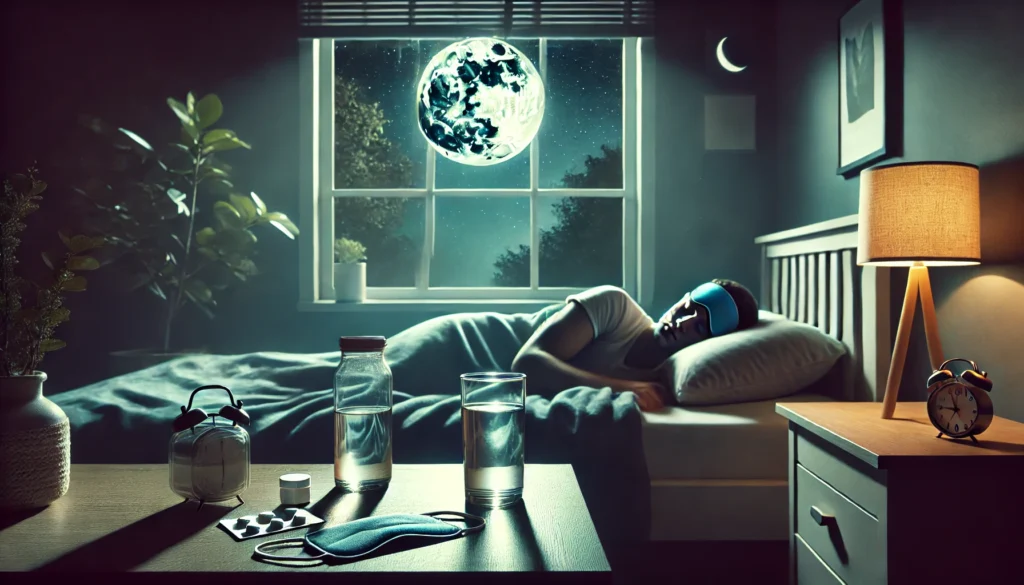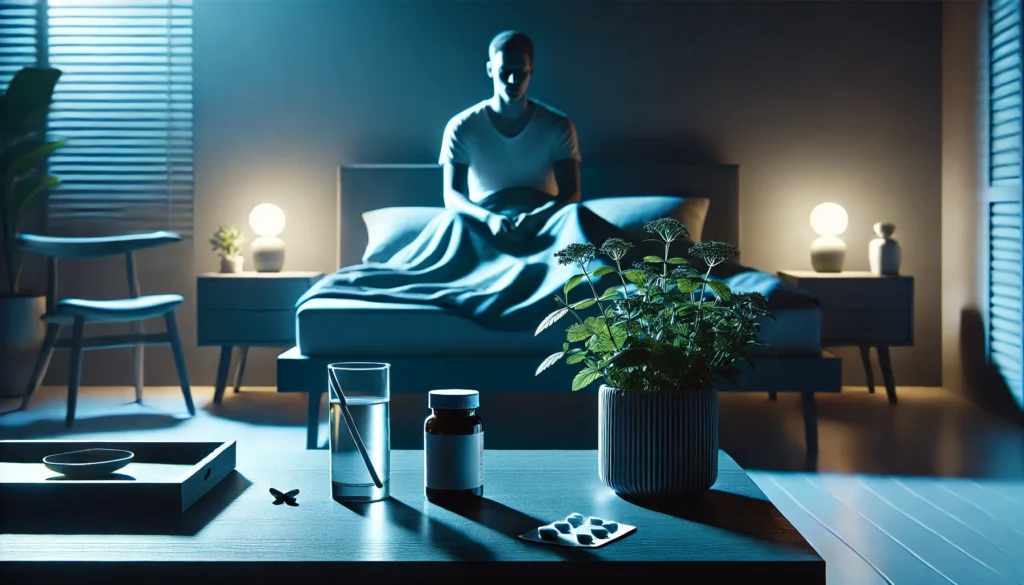In today’s world, where stress and sleeplessness are becoming increasingly intertwined, a pressing question looms for millions of individuals struggling with both issues: can anti-anxiety meds help with sleep? The intersection of sleep and anxiety is more than just a clinical concern; it represents a deeply human challenge, one that disrupts daily life, compromises mental health, and reduces overall quality of life. For many, the inability to sleep stems from an unrelenting current of anxious thoughts, while others find that chronic insomnia begins to fuel their feelings of worry and apprehension. In this cyclical relationship, treating one without addressing the other often yields incomplete results.
You may also like: Proven Relaxation Techniques for Stress and Anxiety: Evidence-Based Strategies to Calm Your Mind and Body
This article explores the complex interplay between anxiety and sleep disorders and offers a research-backed look at how pharmacological treatments, especially anti-anxiety medications, may provide relief. At the same time, it considers the safety, limitations, and long-term implications of combining sleep and anxiety meds. Our goal is to equip readers with comprehensive knowledge grounded in medical expertise and real-world application. By understanding the mechanisms, benefits, and risks of these medications, individuals can make informed decisions that enhance both their nighttime rest and their daytime mental clarity.
Understanding the Connection Between Anxiety and Sleep Disturbances
Anxiety and sleep disturbances often coexist in a mutually reinforcing loop. When the brain is in a heightened state of alertness, the ability to initiate or maintain sleep is significantly compromised. Individuals suffering from generalized anxiety disorder (GAD), panic disorder, or even situational anxiety often report racing thoughts at bedtime, muscle tension, and a persistent sense of dread that makes relaxation elusive. This leads to fragmented sleep or total insomnia, which in turn depletes the brain’s emotional regulation capacity and intensifies feelings of anxiety the following day.
Research in sleep medicine has consistently shown that poor sleep exacerbates symptoms of anxiety, while untreated anxiety significantly raises the risk of developing chronic sleep disorders. Neurobiologically, both anxiety and sleep regulation involve key brain structures such as the amygdala, hippocampus, and prefrontal cortex, as well as shared neurotransmitters like serotonin, dopamine, and gamma-aminobutyric acid (GABA). The dysregulation of these systems can perpetuate a cycle of hyperarousal and restlessness, reinforcing the bidirectional nature of the problem.
Understanding this relationship is crucial for developing effective treatment strategies. Traditional approaches that treat anxiety and insomnia as separate conditions often miss the underlying neurological overlap. This is where combined therapeutic strategies, including medications that target both anxiety and sleep disturbances, begin to offer a compelling avenue for exploration. However, while the appeal of a single solution is strong, it’s essential to evaluate how effective—and how safe—such options truly are.
How Anti-Anxiety Medications Affect Sleep
Anti-anxiety medications, particularly those classified under benzodiazepines, selective serotonin reuptake inhibitors (SSRIs), serotonin-norepinephrine reuptake inhibitors (SNRIs), and atypical anxiolytics, can have varying effects on sleep architecture and quality. Benzodiazepines, such as lorazepam and diazepam, have long been used for their sedative and anxiolytic properties. These medications act quickly by enhancing the activity of GABA, a calming neurotransmitter, thereby reducing the physiological symptoms of anxiety and promoting sleep onset.
However, benzodiazepines are not without drawbacks. Long-term use can lead to tolerance, dependence, and disruptions in REM (rapid eye movement) sleep, a critical phase associated with emotional memory consolidation and psychological well-being. Additionally, their use has been linked to morning grogginess and impaired cognitive functioning, particularly in older adults. As such, many clinicians now prefer prescribing these medications only for short-term or acute episodes.
SSRIs and SNRIs, which are often used as first-line treatments for anxiety disorders, have a more complex relationship with sleep. While they may reduce anxiety symptoms over time, their impact on sleep varies widely. Some individuals report improved sleep as their anxiety diminishes, while others experience insomnia, vivid dreams, or nighttime awakenings as side effects. For example, fluoxetine (Prozac) and venlafaxine (Effexor) are known to cause sleep disturbances in certain patients, whereas paroxetine (Paxil) and escitalopram (Lexapro) may have more neutral or even sedative effects.
Atypical anxiolytics, such as buspirone, offer another alternative. These medications do not carry the same risk of dependency as benzodiazepines and often have fewer effects on sleep architecture. However, they are generally slower to act and may not provide immediate relief for those with acute sleep anxiety. Thus, their utility often lies in long-term management strategies rather than immediate symptom resolution.
What Anxiety Sleep Medication I Can Take As Needed: Short-Term Solutions
When acute anxiety leads to short-term sleep problems, many individuals and healthcare providers turn to medications that can be taken on an as-needed basis. For those wondering what anxiety sleep medication I can take as needed, the answer often depends on the severity of symptoms, overall health, and history of medication use. Common short-term solutions include low-dose benzodiazepines, certain antihistamines with sedative effects, and occasionally, medications like zolpidem (Ambien) or eszopiclone (Lunesta), which are classified as non-benzodiazepine hypnotics.
Benzodiazepines such as temazepam (Restoril) are particularly effective when anxiety is the primary barrier to sleep. Their quick onset and muscle-relaxing properties make them suitable for temporary use during periods of intense stress, such as bereavement, travel-related anxiety, or acute life changes. However, due to the risks of tolerance and dependence, they should be used sparingly and under medical supervision.
Hydroxyzine, a sedating antihistamine with anxiolytic properties, is another option that can be taken as needed. It has the advantage of being non-addictive and is often used in individuals with a history of substance misuse. While it can be effective in calming the mind and inducing sleep, it may cause next-day drowsiness and dry mouth in some users.
Other medications like doxepin, a tricyclic antidepressant with strong sedative effects at low doses, and the melatonin receptor agonist ramelteon may also be used on an as-needed basis. However, these are more commonly part of a broader treatment plan aimed at chronic insomnia rather than acute anxiety-induced sleep disruption.
It’s essential to remember that even when taken occasionally, these medications can influence sleep patterns and carry potential side effects. Thus, they should only be used under the guidance of a healthcare provider who can evaluate the full scope of an individual’s medical and psychological history.

The Best Medication for Sleep and Anxiety: What Does Research Say?
Determining the best medication for sleep and anxiety involves a nuanced analysis of individual needs, symptom patterns, and tolerance to various pharmacological agents. There is no one-size-fits-all solution, but certain medications have emerged as more effective across broader populations. In clinical practice, the combination of therapeutic efficacy, minimal side effects, and low risk of dependency are the criteria that often define the best choices.
For individuals with persistent anxiety and chronic insomnia, medications like trazodone and mirtazapine are frequently considered. Trazodone, originally developed as an antidepressant, has strong sedative effects and is commonly prescribed off-label for insomnia associated with anxiety or depression. Mirtazapine, another atypical antidepressant, also promotes sleep and reduces anxiety by enhancing the activity of serotonin and norepinephrine, while simultaneously blocking histamine receptors, which contributes to its sedative qualities.
Among SSRIs, escitalopram and paroxetine are often favored when sleep disturbances are prominent. These medications tend to be better tolerated in terms of their impact on sleep compared to activating SSRIs like fluoxetine. For individuals seeking alternatives to traditional antidepressants, medications like quetiapine—a low-dose atypical antipsychotic—may be used off-label for its sedative and anxiolytic properties. However, such use requires careful monitoring due to the risk of metabolic side effects, including weight gain and elevated cholesterol.
Recent research has also explored the use of gabapentin and pregabalin, both originally developed for seizure disorders, in managing sleep and anxiety symptoms. These medications modulate calcium channels in the brain and reduce neural excitability, making them effective for individuals with generalized anxiety disorder and concurrent insomnia. Unlike benzodiazepines, they carry a lower risk of addiction and may improve sleep continuity without disrupting REM cycles.
Ultimately, selecting the best medication for sleep and anxiety must involve a thorough evaluation by a qualified mental health professional or sleep specialist. Personalized treatment planning, which considers the full spectrum of symptoms and patient history, remains the cornerstone of effective intervention.
Medicine for Sleep Anxiety: Understanding Long-Term Use and Risks
When considering medicine for sleep anxiety, it is crucial to differentiate between short-term symptom relief and sustainable long-term management. Many individuals begin using pharmacological treatments during times of acute distress, but over time, continued reliance on these medications may pose significant risks. These include physical dependency, tolerance (requiring higher doses to achieve the same effect), and withdrawal symptoms upon discontinuation.
Benzodiazepines, though effective for immediate anxiety reduction and sleep induction, are particularly problematic for long-term use. Their potential to cause dependency has led to growing caution among prescribing physicians. As a result, long-acting alternatives such as SSRIs and SNRIs are often favored for chronic sleep anxiety, despite their slower onset and potential for initial side effects.
Moreover, medications that affect neurotransmitter systems involved in both sleep and emotional regulation—like serotonin, dopamine, and norepinephrine—require ongoing monitoring. Side effects such as weight gain, sexual dysfunction, and emotional blunting can diminish quality of life and lead to medication noncompliance. In some cases, augmenting medication with behavioral strategies such as cognitive-behavioral therapy for insomnia (CBT-I) or mindfulness-based stress reduction (MBSR) can allow for lower medication doses and improved long-term outcomes.
Emerging therapies and pharmaceutical advancements are also expanding the toolkit for managing chronic sleep anxiety. Novel agents targeting orexin receptors, like suvorexant and lemborexant, show promise in promoting sleep without the same risk of dependency seen with older medications. These drugs selectively inhibit the wake-promoting neuropeptides orexin-A and orexin-B, thereby facilitating sleep initiation and maintenance without significantly altering natural sleep architecture.
Despite these advancements, any long-term plan for managing sleep and anxiety with medication should include regular reevaluation of its necessity, efficacy, and safety. A collaborative approach that includes physicians, mental health professionals, and sleep specialists offers the most comprehensive and sustainable path forward.
Integrating Behavioral and Lifestyle Strategies with Medication
While pharmacological treatments can provide significant relief, their effectiveness is often amplified when combined with non-drug approaches. Behavioral and lifestyle strategies not only address the root causes of sleep anxiety but also foster resilience against future episodes. These strategies range from structured cognitive-behavioral therapies to more individualized routines aimed at creating a sleep-conducive environment.
Cognitive-behavioral therapy for insomnia (CBT-I) has become the gold standard non-pharmacological intervention for chronic sleep issues. It focuses on identifying and altering maladaptive thought patterns and behaviors that perpetuate insomnia. For those also experiencing anxiety, CBT-I can be tailored to include anxiety-reduction techniques such as cognitive restructuring, progressive muscle relaxation, and exposure therapy. When used alongside sleep and anxiety meds, CBT-I often reduces the necessary medication dosage and improves long-term outcomes.
Lifestyle modifications, though seemingly simple, can have profound effects on sleep quality and anxiety levels. Maintaining a consistent sleep schedule, limiting caffeine and alcohol intake, engaging in regular physical activity, and establishing a relaxing pre-bedtime routine can support the brain’s natural circadian rhythms. Practices such as mindfulness meditation, yoga, and journaling have also shown efficacy in reducing pre-sleep cognitive arousal and enhancing emotional regulation.
Social support and environmental factors should not be overlooked. A supportive home environment, open communication with loved ones, and even subtle changes such as dimming lights or reducing screen exposure before bed can create a more peaceful and sleep-friendly setting. For many, integrating these strategies into daily life not only improves sleep but also restores a sense of control and agency—critical elements in the management of anxiety.
Ultimately, combining behavioral strategies with appropriate medicine for sleep anxiety offers a holistic and sustainable treatment approach. This integration acknowledges that while medications can recalibrate brain chemistry in the short term, lasting change often stems from consistent, mindful habits rooted in personal empowerment and psychological resilience.
Safe and Effective Use of Sleep and Anxiety Meds: Best Practices
Safety is paramount when using medications to treat co-occurring sleep and anxiety disorders. Although sleep and anxiety meds can offer transformative relief, their benefits must always be weighed against potential risks. Best practices in medication management include accurate diagnosis, personalized treatment planning, and ongoing monitoring to ensure continued effectiveness and minimize adverse effects.
Working with a qualified healthcare provider is essential to determine the most appropriate medication based on the individual’s medical history, current symptoms, and any coexisting conditions. Comprehensive assessments often include mental health evaluations, sleep studies, and reviews of lifestyle factors that may contribute to the problem. By taking a personalized approach, healthcare providers can recommend targeted treatments that reduce reliance on trial-and-error methods.
Adherence to prescribed dosages and schedules plays a critical role in achieving optimal outcomes. Patients should avoid abruptly discontinuing medications without medical guidance, as this can lead to withdrawal symptoms or a resurgence of anxiety and sleep disturbances. Open communication with healthcare providers about side effects, changes in symptoms, or emerging concerns enables timely adjustments and fosters a collaborative treatment relationship.
Education around the safe use of sleep and anxiety meds is also vital. Patients must be aware of potential interactions with other medications, substances such as alcohol or recreational drugs, and underlying health conditions that may affect drug metabolism. In some cases, genetic testing or pharmacogenetic profiling can provide insights into how an individual might respond to specific medications, offering a more precise and effective treatment plan.
Combining medication with behavioral therapies and lifestyle changes provides the most comprehensive and enduring solution. By embracing an integrated approach, patients can address both the biochemical and psychological aspects of their condition, achieving deeper, more restorative sleep while simultaneously reducing anxiety levels.

Frequently Asked Questions (FAQ): Sleep and Anxiety Medications
1. Can anti-anxiety meds help with sleep even if I don’t have a diagnosed anxiety disorder?
Yes, some anti-anxiety medications may improve sleep even in individuals who haven’t been formally diagnosed with an anxiety disorder. This is particularly true when the root of sleep disturbances is subclinical anxiety, such as persistent worry or anticipatory stress that doesn’t meet diagnostic criteria but still affects rest. In such cases, low-dose medications that calm the nervous system—like hydroxyzine or buspirone—may provide relief without the need for long-term antidepressants. However, it’s essential to evaluate the risks and benefits of using these drugs for sleep alone. While it’s valid to ask, “can anti-anxiety meds help with sleep?”, the answer lies in understanding the underlying cause of your insomnia and choosing a treatment strategy that aligns with your long-term mental health goals.
2. What are the implications of using sleep and anxiety meds during major life transitions, like moving or grief?
Life transitions often trigger temporary spikes in anxiety that can disrupt sleep. During such times, using sleep and anxiety meds as part of a short-term support plan can be effective. For example, medications like temazepam or low-dose trazodone can help restore rest without requiring a long-term commitment. The key is to avoid over-reliance, as these transitional periods can sometimes become prolonged or lead to dependency if not monitored. Recognizing when temporary support with medicine for sleep anxiety is beneficial—and when it’s becoming a crutch—is critical to emotional resilience and long-term recovery.
3. Are there differences in how men and women respond to anxiety sleep medications?
Yes, biological sex can significantly influence how medications for anxiety and sleep are metabolized and experienced. Women, for instance, often report more sensitivity to side effects like sedation and weight gain, especially with SSRIs or medications like mirtazapine. Hormonal fluctuations related to the menstrual cycle or menopause may also intensify sleep problems, making the choice of medication more nuanced. Some researchers believe that differences in GABA receptor expression could explain why women may benefit more quickly from certain benzodiazepines but also face a higher risk of dependency. Therefore, discussions about what anxiety sleep medication I can take as needed should be personalized and may differ between men and women.
4. How do anti-anxiety medications impact dreams and emotional processing during sleep?
Certain anti-anxiety medications—especially benzodiazepines and SSRIs—can alter REM sleep, which is closely tied to emotional memory processing and dream intensity. While these medications might reduce nightmares or vivid dreams in people with PTSD or generalized anxiety, they can also suppress REM phases, leading to less restorative emotional integration. Newer alternatives, such as orexin receptor antagonists, aim to preserve natural sleep cycles while still calming the nervous system. This is particularly important for those using sleep and anxiety meds long-term, as preserving REM sleep is essential for emotional resilience. Anyone considering whether anti-anxiety meds can help with sleep should be aware of their impact not only on sleep quantity but also on sleep quality and emotional health.
5. What role does tolerance play in the effectiveness of medicine for sleep anxiety over time?
Tolerance is a well-documented phenomenon, especially with medications like benzodiazepines and certain hypnotics. Over time, the body becomes less responsive, requiring higher doses to achieve the same effect. This can lead to a dangerous cycle of increasing usage, reduced efficacy, and eventual dependence. For those using medicine for sleep anxiety, it’s crucial to alternate medications or include non-drug interventions like CBT-I to maintain long-term effectiveness. Discussing tolerance with a provider ensures a treatment strategy that remains effective without escalating risk.
6. Can anti-anxiety meds help with sleep if insomnia is caused by chronic pain or physical illness?
They can, but the strategy needs to be carefully balanced. Anxiety often coexists with chronic illness or pain, amplifying distress and disturbing sleep. In such cases, medications like gabapentin or duloxetine, which address both nerve pain and anxiety, may offer dual benefits. While anti-anxiety medications may not address the root cause of physical discomfort, they can mitigate the emotional and cognitive distress that exacerbates insomnia. Thus, for individuals dealing with chronic pain, sleep and anxiety meds should be part of an integrated treatment plan involving pain management, physical therapy, and possibly sleep hygiene coaching.
7. How do lifestyle and behavioral interventions influence the need for medication?
Lifestyle changes can significantly reduce the need for pharmacological interventions. In many cases, incorporating exercise, mindfulness, and structured sleep routines can minimize reliance on medication altogether. Behavioral therapies like CBT-I are particularly effective at breaking the cycle of sleeplessness and anxiety without pharmacological support. When patients ask about the best medication for sleep and anxiety, healthcare providers often emphasize that medications are most effective when used in conjunction with lifestyle changes—not as standalone solutions. This integrative approach reduces side effects, preserves natural sleep architecture, and empowers long-term self-regulation.
8. What anxiety sleep medication I can take as needed without building dependency?
For those seeking flexibility without high dependency risk, medications like hydroxyzine, ramelteon, or even low-dose doxepin are often considered safer choices. These are generally non-habit-forming and can be taken on an as-needed basis during high-stress periods. Unlike benzodiazepines or Z-drugs (like zolpidem), these options typically do not lead to withdrawal symptoms or tolerance with intermittent use. When exploring what anxiety sleep medication I can take as needed, it’s essential to consider both the medication’s pharmacokinetics and your own history with anxiety or substance use. Regular check-ins with your healthcare provider help ensure these short-term solutions don’t evolve into long-term risks.
9. What innovations are emerging in the field of sleep and anxiety medications?
The pharmaceutical landscape is evolving, with several exciting developments in medications targeting both anxiety and sleep. Newer agents like orexin antagonists, such as daridorexant, aim to induce sleep by modulating wakefulness without suppressing natural REM cycles. There’s also growing interest in cannabidiol (CBD) formulations and psychedelics like psilocybin, which may help rewire anxiety circuits and restore sleep patterns without traditional sedation. Additionally, digital therapeutics, including app-based behavioral treatments, are being paired with medication regimens for synergistic effects. As science continues to explore the question, “can anti-anxiety meds help with sleep?” these innovations offer hope for more targeted, effective, and personalized interventions in the future.
10. How can I safely transition off long-term sleep and anxiety meds?
Discontinuing long-term use of sleep and anxiety medications requires a deliberate, medically supervised plan. Gradual tapering is usually recommended to prevent rebound insomnia or withdrawal symptoms, especially with medications that affect GABA pathways. Integrating CBT-I, mindfulness practices, and supportive psychotherapy during the tapering process significantly increases the likelihood of success. It’s also helpful to prepare for temporary sleep disturbances as the brain recalibrates its natural rhythms. Ultimately, transitioning off medications doesn’t mean abandoning treatment; rather, it signals a shift toward more sustainable methods of managing anxiety and sleep without compromising well-being. For many, this transition answers the question of what the best medication for sleep and anxiety is—not a drug, but a balanced, individualized plan.

Conclusion: Navigating the Journey Toward Restful Nights and Calmer Days
In the quest to answer the question, “Can anti-anxiety meds help with sleep?” the evidence points to a cautious yes—when used thoughtfully, strategically, and in conjunction with non-pharmacological strategies. These medications offer a powerful tool in breaking the cycle of sleep disruption and anxiety, but they are not a panacea. The best outcomes are seen when sleep and anxiety meds are part of a broader, individualized treatment plan that includes behavioral therapy, lifestyle modifications, and regular medical oversight.
For those exploring what anxiety sleep medication I can take as needed, short-term use may offer the immediate relief necessary to regain control. Meanwhile, identifying the best medication for sleep and anxiety over the long term requires collaboration, ongoing evaluation, and a willingness to adapt treatment plans as needs evolve. Medicine for sleep anxiety can be both effective and safe when integrated into a holistic approach that prioritizes long-term well-being over quick fixes.
As science continues to deepen our understanding of the neurobiological links between sleep and anxiety, new medications and therapeutic approaches will likely emerge. Yet, the core principles will remain the same: thoughtful assessment, tailored treatment, and a commitment to addressing both the symptoms and root causes of distress. In this way, the journey toward restful nights and calmer days becomes not only possible but profoundly transformative for those willing to embrace a comprehensive path to healing.
natural remedies for insomnia, chronic stress and sleep, GABA supplements for relaxation, insomnia treatment options, how to calm racing thoughts, emotional regulation techniques, nighttime anxiety relief, sleep therapy methods, over-the-counter sleep aids, cognitive behavioral therapy for sleep, melatonin alternatives, anxiety and REM sleep, managing sleep disorders, psychological effects of insomnia, mental health and rest, circadian rhythm support, nervous system calming strategies, sleep hygiene practices, non-addictive sleep aids, integrative approaches to anxiety management
Further Reading:
Medicines used in generalized anxiety and sleep disorders
Prescription sleeping pills: What’s right for you?
Medication to Treat Anxiety Disorders
Disclaimer
The information contained in this article is provided for general informational purposes only and is not intended to serve as medical, legal, or professional advice. While Health11News strives to present accurate, up-to-date, and reliable content, no warranty or guarantee, expressed or implied, is made regarding the completeness, accuracy, or adequacy of the information provided. Readers are strongly advised to seek the guidance of a qualified healthcare provider or other relevant professionals before acting on any information contained in this article. Health11News, its authors, editors, and contributors expressly disclaim any liability for any damages, losses, or consequences arising directly or indirectly from the use, interpretation, or reliance on any information presented herein. The views and opinions expressed in this article are those of the author(s) and do not necessarily reflect the official policies or positions of Health11News.


